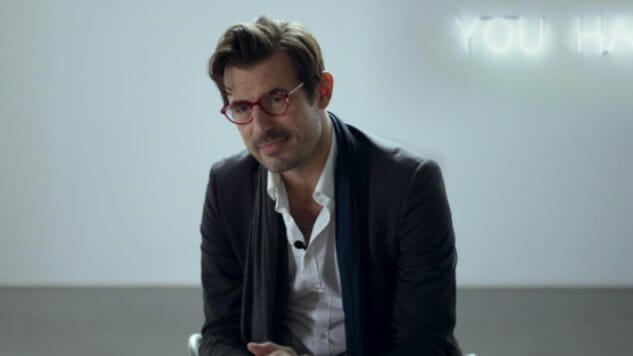The Square
2017 Cannes Review

Sporting the ambition and sweep of a limited-run TV series, The Square may be overstuffed, but it never stops churning ideas and incidents. The follow-up film from Swedish writer-director Ruben Östlund finds him working again in a satirical vein, pinpointing the frailties of a proud man destined to be laid low. And as with Force Majeure, he’s willing to push his premise to its breaking point, just to see how far it can go. The pleasure is in watching his nerve.
The film takes place largely at X-Royal Museum, where Christian (Claes Bang) is chief curator. Taking to wearing scarves and red spectacles, he dresses the part of high art’s posh public ambassador, carrying himself with a regal air. But for all his puffed-up posturing, he does care about the artists whose work he champions. Christian is especially excited about his forthcoming exhibition, an installation called “The Square,” which consists of a simple square drawn on the floor in the center of a room. The work advises viewers that it’s “a sanctuary of trust and caring. Within it we all share equal rights and obligations.” The wider world may be horribly inequitable, but this piece of art creates a safe space in which everyone helps his fellow man.
The Square walks a fine line, not always successfully, about its attitude toward the museum’s postmodern art. There’s a bit of a shooting-fish-in-a-barrel quality to the film’s comedic targets: Mocking the pretensions of, say, a room filled entirely with neat little piles of dirt is a bit easy. It’s also a bit hypocritical for a film that boldly aspires to bite off more than it can chew over its 140-minute run time to lampoon other creator’s ideas about art. And even Christian’s fondness for his new exhibition’s altruistic aspirations feels a bit pat—as expected, what he admires in “The Square” is much harder to replicate in his real life.
The movie doesn’t have a straightforward narrative so much as it bears a series of tangential storylines. Beyond preparing to mount “The Square,” Christian is also trying to recover his stolen wallet and cellphone, woo a pretty American journalist (Elisabeth Moss) and, later, deal with the fallout after he gets back his personal property. In addition, a willfully controversial marketing campaign for “The Square” will blow up in his face, threatening his future at the museum. At any point in The Square, any of these subplots takes center stage, Östlund crafting a portrait of a man in full, through the different predicaments bedeviling him.
Bang has a tricky task, presenting Christian as a fundamentally good guy who’s too enraptured with his own self-importance. After he goes to bed with Moss’s journalist, he becomes paranoid that she wants to save his used condom to get pregnant—a conceited anxiety that leads to one of the film’s more humorously awkward exchanges. Later, when she confronts him about his intentions toward her, Christian can’t help but engage her in a debate about power dynamics in relationships, accusing her of being attracted to him in part because of his impressive title.
-

-

-

-

-

-

-

-

-

-

-

-

-

-

-

-

-

-

-

-

-

-

-

-

-

-

-

-

-

-

-

-

-

-

-

-

-

-

-

-








































